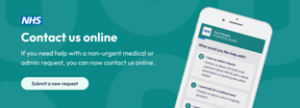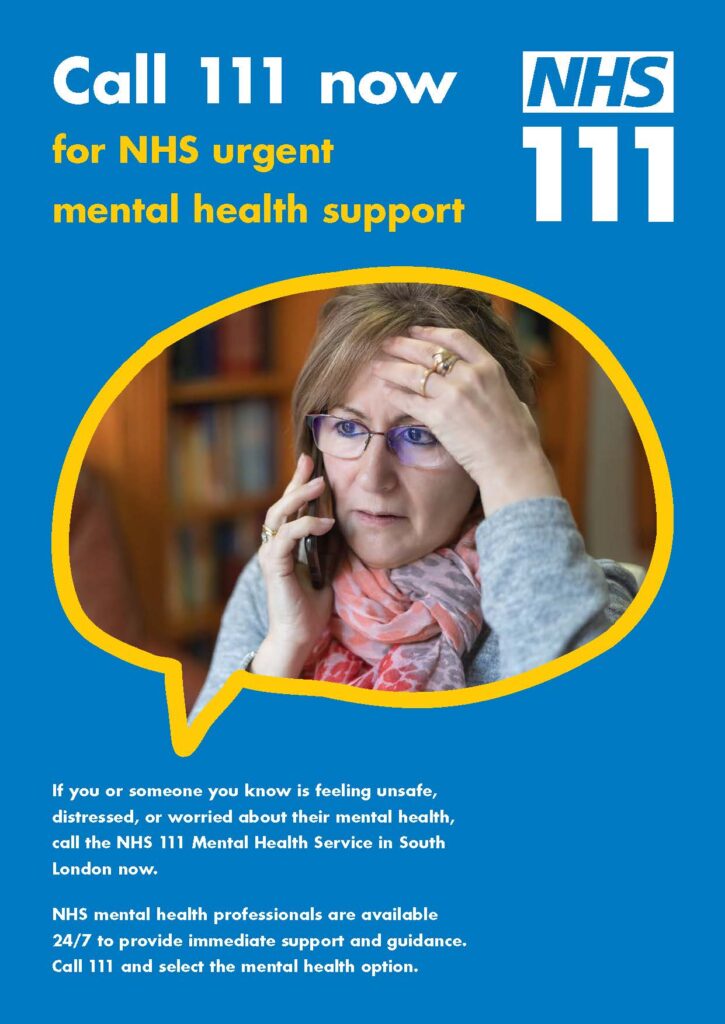London Breast Screening is part of the National Breast Screening Programme, providing a free breast screening service for women aged between 50-71 (first invitation issued by 53rd birthday), who are resident in London and West Hertfordshire.
If you have any concerns about changes to you breasts www.breastcancernow.org/information-support/have-i-got-breast-cancer/signs-symptoms-breast-cancer, please speak with your GP as soon as possible.
If you have breast pain, more information is available here www.rmpartners.nhs.uk/new-video-to-help-understand-breast-pain
Watch this information video on Breast Screenings here
Benzodiazepines (e.g. Diazepam/ Lorazepam/Temazepam/Alprazolam/ Clonazepam) are drugs which have been in use since the 1960s for treatment of a wide range of conditions including alcohol withdrawal, agitation and restlessness, anxiety, epilepsy and seizures, neurological disorders. muscle spasms, psychiatric disorders and sleep disturbance.
Initially benzodiazepines were hailed as a wonder drug. However, it became increasingly clear that, as well as having short term effects on memory, co-ordination, concentration and reaction times.
Unfortunately, benzodiazepines have also become a widely used drug of abuse since they first came on the market. Because of these reasons the use of benzodiazepines has been a lot more controlled around the world since the 1980-90s, especially in the UK. Diazepam in the UK is a Class C/Schedule IV controlled drug.
We are often asked to prescribe sedative drugs, such as diazepam, for fear of flying. We have recently agreed a practice policy that we will no longer prescribe these drugs for fear of flying.
There are a number of good reasons why prescribing of drugs such as diazepam is not deemed safe and is no longer recommended:-
Benzodiazepines such as Diazepam and other sedative drugs are no longer recommended for treatment of phobias because other treatments are safer and more effective.
Diazepam is a sedative, which means it makes you sleepy and slows reaction times. If there is an emergency during a flight, it may affect your ability to concentrate, follow instructions and react to the situation. This could have serious safety consequences for you and others.
The sedative effects of these drugs can affect breathing and cause low oxygen levels, which could be life threatening, especially with the lower circulating oxygen levels on an aeroplane, in people with breathing problems or when combined with alcohol.
Sedative drugs can make you fall asleep, however this is not a natural sleep. This means you won’t move around as much as during natural sleep and this can increase your risk of developing a blood clot (DVT) in your leg or lung. Blood clots are dangerous and can be fatal. This risk is greater if your flight is longer than four hours.
Whilst most people find medicines such as diazepam sedating, a small number of people become agitated, aggressive or confused. These medicines can also cause disinhibition and lead to abnormal behaviours. This could impact on your safety as well as that of other passengers.
According to the prescribing guidelines doctors follow (British National Formulary) diazepam is not recommended in treating phobic states. It also states that “the use of benzodiazepines to treat short-term ‘mild’ anxiety is inappropriate.” Your doctor would be taking a significant legal risk by prescribing against these guidelines. They are only licensed short term for a crisis in generalised anxiety.
NICE guidelines suggest that these medications are only advised for the short term use for a crisis in generalised anxiety disorder in which case a person is not fit to fly. Fear of flying in isolation is not a generalised anxiety disorder.
We recognise that fear of flying is real and frightening, and we don’t underestimate the impact it can have. However we will no longer be having any consultations to discuss medication for fear of flying. Patients who still wish to take benzodiazepines for flight anxiety are advised to consult with a private GP or travel clinic.
We recommend tackling the phobia in a different way by using self-help resources or considering one of the ‘Fear of Flying’ course run by many airlines. We do not recommend any specific course but you may find the following links useful.
https://flyingwithconfidence.com/ (British Airways)
https://flywith.virginatlantic.com/bb/en/wellbeing-and-health/flying-without-fear.html (Virgin Atlantic)
https://www.fearlessflyer.easyjet.com/ (Easy Jet)
We are an accredited Gambling Harms practice.
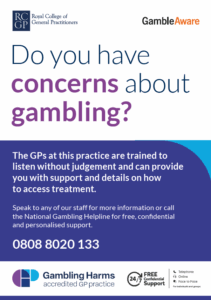
This means that as a surgery we are committed to improving support for patients experiencing gambling harms.
The GPs at this practice are trained to listen without judgement and can provide you with support and details on how to access treatment. Speak to any of our staff for more information or call the National Gambling Helpline for free, confidential and personalised support. 0808 8020 133
PIP Applications Housing Support
Please be aware that our clinicians do not write supporting letters to the DWP for PIP claims.
Instead, the DWP will send us a form to complete once you have applied for PIP, or applied for renewal of your PIP.
Your named GP will complete the form with the specific information they require. This helps to prevent over-divulging information to the DWP which may not be relevant to your claim.
The application pack for PIP clearly states that you DO NOT require a letter from the GP.
Once we receive the request from the DWP it will be completed within 28 days by your named GP.
Housing Support
Please be aware that our clinicians do not write supporting letters to the council for housing support.
We ask patients to submit changes with the council/housing officer and should they require more information they will write to us directly.
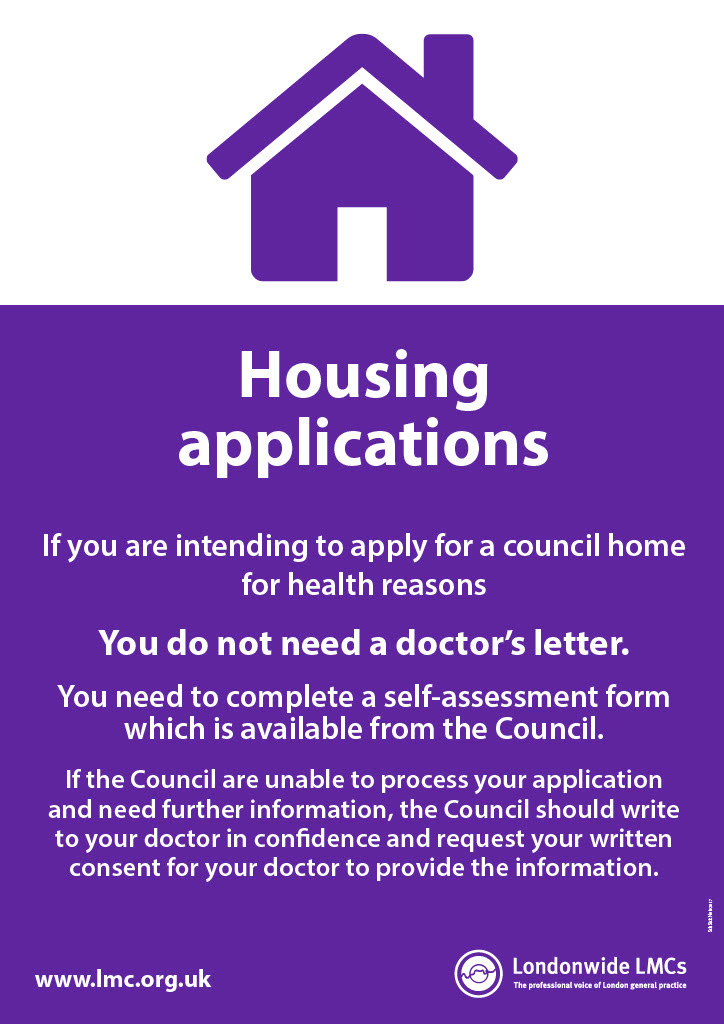
In Times of Bereavement
In the unfortunate event that a person has passed away, there are three things that must be done in the first few days;
- Get a medical certificate from your GP or hospital doctor (this is necessary to register the death)
- Register the death within 5 days (8 days in Scotland). You will then receive the necessary documents for the funeral.
- Make the necessary funeral arrangements.
Register the death
If the death has been reported to the coroner (or Procurator Fiscal in Scotland) they must give permission before registering the death.
You can register the death if you are a relative, a witness to the death, a hospital administrator or the person making the arrangements with the funeral directors.
You can use the ‘Register a Death’ page on the gov.uk website that will guide you through the process. This will also explain the registration process for Scotland and Northern Ireland.
Arrange the funeral
The funeral can usually only take place after the death is registered. Most people use a funeral director, though you can arrange a funeral yourself.
Funeral directors
Choose a funeral director who’s a member of one of the following:
These organisations have codes of practice – they must give you a price list when asked.
Some local councils run their own funeral services, for example for non-religious burials. The British Humanist Association can also help with non-religious funerals.
Arranging the funeral yourself
Contact the Cemeteries and Crematorium Department of your local council to arrange a funeral yourself.
Funeral costs
Funeral costs can include:
- funeral director fees
- things the funeral director pays for on your behalf (called ‘disbursements’ or ‘third-party costs’), for example, crematorium or cemetery fees, or a newspaper announcement about the death
- local authority burial or cremation fees
Funeral directors may list all these costs in their quotes.
Kooth is an anonymous site which offers emotional and mental health support for children and young people aged between 11 and 24. On Kooth, qualified counsellors are online seven days a week to provide young people using the service with online counselling, through chat-based messaging via drop-in or booked sessions, which helps children and young people to feel safe and confident in exploring their concerns and seeking professional support. Kooth.com is an online application removing the need for Apple/Android accounts, data requirements and the stigma of mental health apps on your devices.
The more you know about your pregnancy and your options, the more you are likely to feel in control. The information given here is based on The Pregnancy Book, which your midwife should give you at your first appointment.
Self Refer Online
To St Georges
https://www.stgeorges.nhs.uk/pregnancy-referral-form/
To Chelsea & Westminster
https://www.chelwest.nhs.uk/services/maternity/self-refer-online/maternity-self-referral
Your pregnancy and labour
You and your baby
British Pregnancy Advisory Service
There is a new Central NHS Computer System called the Summary Care Record (SCR). It is an electronic record which contains information about the medicines you take, allergies you suffer from and any bad reactions to medicines you have had.
Why do I need a Summary Care Record?
Storing information in one place makes it easier for healthcare staff to treat you in an emergency, or when your GP practice is closed.
This information could make a difference to how a doctor decides to care for you, for example which medicines they choose to prescribe for you.
Who can see it?
Only healthcare staff involved in your care can see your Summary Care Record.
How do I know if I have one?
Over half of the population of England now have a Summary Care Record. You can find out whether Summary Care Records have come to your area by looking at our interactive map or by asking your GP
Do I have to have one?
No, it is not compulsory. If you choose to opt out of the scheme, then you will need to complete a form and bring it along to the surgery. You can use the form at the foot of this page.
Watch our introduction video on Total Triage here
Dear Chatfield Patients,
As part of our mission to improve the way in which we deliver care and improve our services, Chatfield Health Care has reviewed patient feedback and has launched our new Total Triage service. This will simplify the process to submit medical and admin requests, and patients will no longer be required to create an account.
This is a national NHS project and all general practices must adopt the Total Triage system by 31st March 2025.
Total Triage has been built by NHS GPs for NHS patients, designed to enhance patient access, improve practice efficiencies and signpost patients to the right place at the right time for their care.
What is Total Triage?
Total triage is a General Practice system where every patient contacting a practice first provides some information on the reasons for contact and is triaged before making an appointment.
All patient requests will be triaged by one of our experienced clinicians who will decide what the best course of action is. Where necessary, we might ask you to answer a few additional questions to help our doctor prioritise those patients who need more urgent care.
You could be given a face to face or telephone appointment, you could have a reply from the GP with self-care advice or you could be signposted to a more appropriate service.
The main purpose of the Total Triage model is to:
• Enhance the quality of care our patients receive.
• Ensure they are given the most appropriate appointment or advice to meet their needs.
• Communicate with patients in a timely way.
• Reduce health inequalities amongst patients.
How does it work?
All patients need to submit their request via the surgery’s website by clicking on the Contact Us Online image.
Ideally, patients will submit their own request however we appreciate that this may not be possible for some patients. If you are unable to use or access the online form then please contact the surgery in the usual way and we will complete the request for you, which will be added to the triage list to be reviewed by the clinician.
After the clinician has reviewed your request you will be offered the most appropriate appointment or guidance. This could be a same day appointment, a self-booking link or it might be a message with advice from the clinician.
Please note that in order for the clinician to triage your request in a timely manner it is very important to provide detailed and accurate information.
For instance if you have a cough it would be much easier for the GP to triage the request with the following information: ‘I had a cough for 10 days. I have already used over the counter medicine, but it is not helping and in the last couple of days my cough has been worsening and it feels more chesty. I also have a high temperature.’
If the information given is less detailed, such as ‘I had a cough for 10 days’, it makes it harder for the GP to triage and we will need more information.
The Total Triage service will be open Monday to Friday. You will not be able to send your GP a Total Triage form over the weekend, when you should instead contact the NHS 111 service. NHS 111 will put you in touch with the out of hours doctor if your problem needs GP assistance over the weekend.
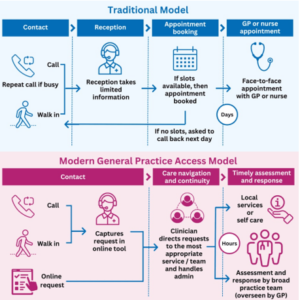
How does this benefit you?
We know that change can be difficult sometimes, but we are confident that Total Triage will bring many benefits to our patients – for example:
• Total Triage has been shown to reduce waiting times and it enables us to attend to your medical needs more promptly.
• Using digital communication will mean that you can engage with us from the comfort of your home or workplace.
• Total Triage ensures that limited healthcare resources are allocated to patients who need them most urgently.
• Total Triage will address the increasing demand for appointments and reduce the frustration of having to call and be in a long queue at 8am.
• Using Total Triage means that all of our patient’s admin and medical requests can be assessed in the same way which will reduce inequalities.
You’ll wonder how you did without it!
• You may not need a trip to the surgery and your query may be resolved with a phone call.
• Triage ensures that limited healthcare resources are allocated to patients who need them most urgently.
• By prioritising patient, triage reduces waiting times for those with urgent medical needs. Patients receive timely care, leading to better outcomes.
• Improved patient safety as triage helps to identify high risk patients early, allowing healthcare providers to intervene promptly. This prevents complications and reduces the risk for adverse events.
• Total Triage streamlines the patient flow within the practice and makes the process more organised and efficient.
• You can check health symptoms online and receive on the spot medical advice and treatment guidance thanks to NHS content.
• Access wherever and whenever you want from any device without requiring a log in. Unlike a telephone call, you can complete a Total Triage form at a pace that suits you.
• You can request sick notes and test results and the clinician will advise if you need an appointment. Saving you time.
Frequently Asked Questions
• Will I get an appointment quicker if I speak to reception instead?
Our reception team will no longer be making GP appointments with patients directly. All requests will be passed through the triaging GPs, so if you are able to complete the online form yourself, this will be the most efficient way to request an appointment and, keep the phone lines clear for those that do not have internet access.
• What happens after I submit a query for a medical issue to the practice?
Medical queries will be submitted to our GP-led triage team. A member of the team will respond to you within 2 working days. Conditions that need to be assessed on the same day will be prioritised. The triage team may send you a request for further information in the form of a short questionnaire specific to your issue.
• What happens if I need an urgent appointment?
We will continue to have a duty doctor every day to deal with emergencies. Conditions that require a same day assessment will be booked in on that day or directed to an appropriate service. A member of our Patient Services Team will contact you directly to arrange an appointment after your form has been triaged by a GP. If you have any urgent medical complaint after 4pm please call the Surgery directly to be assessed.
• What happens after I submit a query for a medical issue to the practice?
Medical queries will be submitted to our GP-led triage team. A member of the team will respond to you within 2 working days. Conditions that need to be assessed on the same day will be prioritised. The triage team may send you a request for further information in the form of a short questionnaire specific to your issue.
• What if I do not have access to the internet or struggle to complete forms?
Our practice phone lines will remain open for anyone with accessibility needs who might find it difficult to complete this form and we will of course provide additional support to those patients who are unable to use online resources or have accessibility needs. Our team is here to guide and support all patients every step of the way.
• What if I have more than one medical issue that I need help with?
Please only submit one medical issue per appointment request form, so that you can add sufficient detail for each problem, which will allow our GPs to appropriately deal with your request.
• How do I submit an admin query?
There is an option to submit an admin query on the online form for general administrative issues such as requesting a letter from a doctor and fit notes. A member of the reception team will respond to you within 2 working days.
• What is self-book?
Our team may send you a text message, containing a self-booking link, inviting you to book your own appointment online. Please be advised these links stay live until you book the appointment for up to 7 days.
• Can I choose which clinician I see?
There is an option to specify which clinician you would like to see. We will try to meet this request and when using our self-booking link you will be able to select a specific GP availability permitting.
• Do I need to fill in the form at 8am?
Patient requests are triaged throughout the day by a clinician so you do not need to complete the request at 8am as all requests are triaged the on the same day.
• Can I fill in one form for more than one patient or for the whole family?
No, unfortunately requests for patients must be submitted separately. We have a duty of care to maintain confidentiality and that all requests are triaged appropriately.
We hope to support patients and their families/carers to get used to the new way of contacting the practice and to become comfortable with this over time.
Thank you for working together with us to improve our patient access and for your continued support. We welcome your feedback and ideas moving forward.
Childhood and Baby Immunisation
St John Therapy Centre, 162 St John Hill Battersea, London SW11 2SW
Tuesday – 3.00 pm to 6.00 pm
Wednesday 3.00 to 7.00 pm
Helpline 020 8812 6090
Balham Health Centre, 120 Bedford Hill, London SW12 9HS
Saturday 9.00 am to 12 noon
BCG Clinics held at St John Therapy Centre – Wednesday 11.00 am to 7.00 pm
Wandsworth Carers’ Centre has free services to support unpaid Carers in their caring role and to help them to have a life outside of caring – e.g information and advice, benefits checks, peer support groups, counselling, complementary therapies, back care and lots more.
For more information call: 020 8877 1200
email: info@wandsworthcarers.org.uk
Visit: www.carerswandsworth.org.uk
Wandsworth Wellbeing Hub
Not sure where to go for help?
The wellbeing Hub can put you in touch with organisations, self-help groupgs and activities available in the locum community
Find out more by calling 020 8812 6700 or visit www.wandsworthccg.nhs.uk/hub
General
Major long-term illnesses
- Asthma UK
- British Heart Foundation
- British Lung Foundation
- Cancer Research UK
- Macmillan Cancer Support
- Coeliac UK
- Diabetes UK
- Parkinsons’ Disease Society
Mental Health
Pregnancy
Travel Immunisations Advice
Welfare and General Wellbeing
Wandsworth Talking Therapies provides free confidential psychological and wellbeing interventions for common mental health problems (anxiety disorders or depression).
Referrals are accepted from people aged 18 years and over who are Wandsworth residents, or non-Wandsworth residents who are registered with a Wandsworth GP. This includes those in temporary accommodation in the borough.
About the General Practice Data for Planning
and Research data collection
Your Data
Patient data is used every day to improve healthcare services through planning and research in England, helping to find better treatments and improve patient care.
It helps to decide what new health and care services are required in a local area, informs clinical guidance and policy, and supports researching and developing cures for serious illnesses, such as heart disease, diabetes, and cancer.


